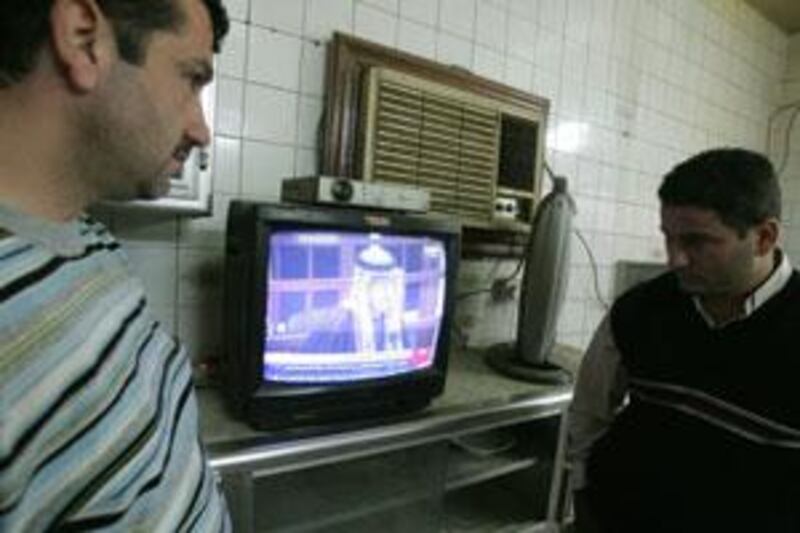BAGHDAD // Few in Iraq were surpised when Ali Hassan al Majid, or Chemical Ali, was handed down a death sentence on Monday for his role in crushing a Shiite uprising in 1999. After all, it was the third time the Iraqi High Tribunal has issued him the verdict. But while most Iraqis are pleased to see the people they consider criminals being brought to justice, many feel the ongoing and often chaotic trials of members of Saddam's regime are being dragged out for political point scoring. "The government is trying to make it long. They don't want the pain of the past to go, it makes them look good," said Qusay Shafeeq, 25, a student. Al Majid is not the only member of Saddam's elite inner circle still on trial. With him at his latest hearing was Tariq Aziz, Saddam's urbane Christian deputy prime minister. Mr Aziz, known for his cigar smoking, was acquitted along with three others. Two others, the former army officer Mahmud Faizi al Hazaa and a senior member of the Baath party, Aziz Saleh Hassan, were also handed the death penalty. Seven others were given jail sentences of between six years and life. "They are playing with people's emotions," said Lu'ay Fadil, 27, an unemployed former arts student. "It is clear [al Majid] is guilty, but some people are getting benefits from a long trial." Some believe the trials of former Baathists are being dragged out by the government to try to make amends for the rushed and flawed trial of Saddam. Many countries, including the United States, raised complaints about the mayhem that surrounded the former dictator's execution. "Saddam was executed too fast. It was a silly thing, a silly trial and a silly execution," said Fadel Mohsin, 36, a writer and commentator. "They made him a hero in the Arab world ? They thought, in a stupid way, that they would stop the sectarian wars and that his followers would give up." Al Majid's death sentence drew a muted response from the Iraqi media, being overshadowed by the visit of Ayatollah Akbar Hashemi Rafsanjani, the former president of Iran and the chairman of the Assembly of Experts. Notorious for his fondness of using chemical weapons, al Majid, Saddam's cousin and a former member of Saddam's Revolutionary Command Council, as well as a former defence minister and adviser, showed little emotion as the judgment was read out. The man who was given the King of Spades in the American-issued "most wanted" playing cards, was arrested by US forces in Basra shortly after the invasion began in 2003, one of the first senior Baathists to be apprehended. His trials, which opened in Aug 2006, became a long-running saga. First he was tried and convicted of a 1988 campaign against the Kurds, in which 180,000 were said to have died and poisonous gas was used on civilians. He was also found guilty of crushing a 1991 Shiite uprising, in which about 100,000 people were killed after turning against Saddam at the end of the First Gulf War. In the latest case he was found guilty of murdering dozens of Shiites in Sadr City and Najaf. The killings were in retaliation to Shiite protests after the assassination of the revered cleric Mohammed Sadeq al Sadr. For all three cases, the court has ordered him to hang for his crimes. It is more than two years since Saddam Hussein was hanged for crimes against humanity and Iraqis were beginning to wonder when Chemical Ali would join him, especially as he has remained unrepentant. At al Majid's first trial, he was reported to have said: "I am the one who gave orders to the army to demolish villages and relocate the villagers. I am not defending myself. I am not apologising. I did not make a mistake." For some Iraqis, the trials have been cathartic, shedding light on the extent of al Majid's crimes."I guess it is important to discover the truth in this trial. He did a lot of bad stuff," Raad Abdul Kabir, 52, a university lecturer, said of the prolonged ordeal. Ali Tariq, 35, a security guard, agreed. "As an Iraqi citizen I think he should have been executed. It was clear Saddam was guilty and it is clear this guy is guilty," he said. For others, the ongoing trials bear little relevance to their lives in post-war Iraq. "We are bored of this now, but what can we do?" said Khaled Salah, 20, a fast food seller in Baghdad. talbone@thenational.ae
Hollow ring to death sentence
Few in Iraq were surpised when Chemical Ali was given the death sentence for his role in crushing a Shiite uprising in 1999.

Editor's picks
More from the national




